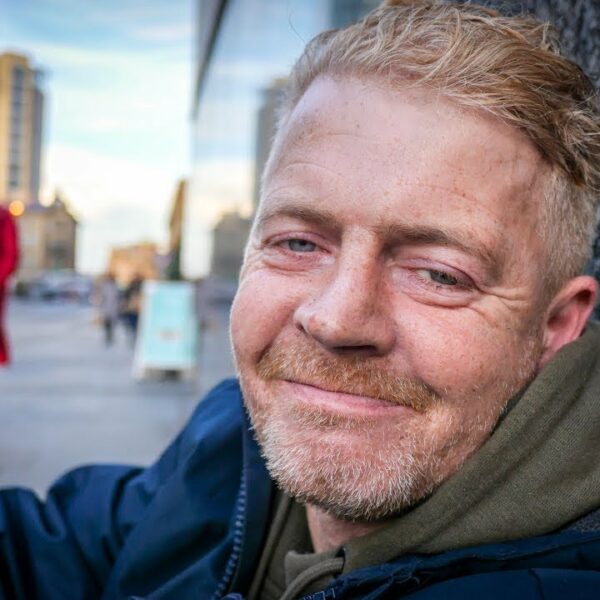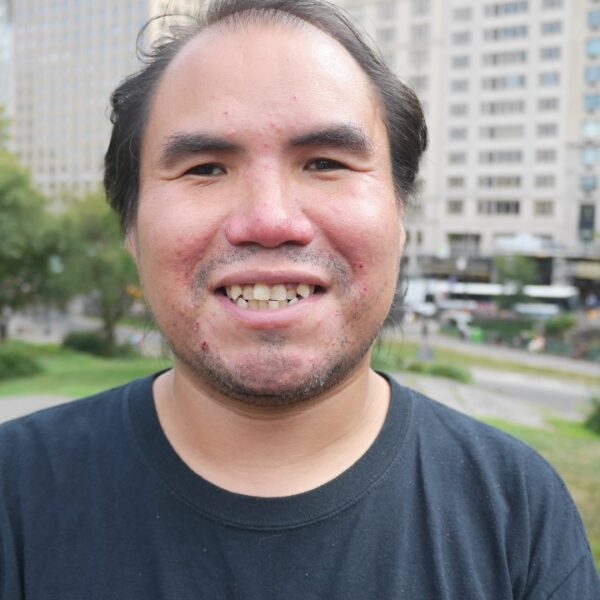The Pandemic Has Boosted the Case for Digital Inclusion in the UK, and Homeless People Must Not Be Left Out
The Covid-19 pandemic has brought into sharp focus the importance of good internet access, and how a lack of it can leave people behind. That includes everyone from children accessing Zoom lessons and workers reliant on a stable internet connection, to clinically vulnerable people ordering groceries and families claiming benefits.
It also includes people who have been made homeless.
The case for improving digital inclusivity for people experiencing homelessness has been clear for many years. Studies and countless lived experiences have shown that access to a mobile phone improves a person’s likelihood of being housed, as well as helping them find employment, access medical care, connect with friends and family, contact authorities when they are unsafe and much more. Invisible People has covered this in depth.
There are several obstacles to providing this digital access. Beyond the cost and logistics of providing tools – whether that’s phones, tablets, laptops, data or wifi – there’s also the risk of devices being damaged or stolen when a person is in a vulnerable position, the difficulty of charging and maintaining devices, and a potential lack of digital literacy which then requires additional support.
Yet they are obstacles that are crucial to overcome.
Has the Pandemic Made Any Difference?
In the UK, as in many other places, the coronavirus pandemic forced charities and local government agencies to change their approaches to outreach.
These groups play a vital role in supporting homeless people. They have reported numerous ways that digital access has been key during the pandemic.
“In the first months of the outbreak, we distributed over 1,000 mobile phones to people we support,” Matt Downie, policy director at homelessness charity Crisis, tells Invisible People.
The team saw directly how these devices were then used to claim benefits, book doctor’s appointments and access information while the UK’s streets emptied and social distancing was introduced.
More than just meeting practical needs, mobile connectivity plays a pivotal role in providing emotional support, Downie explained.
“This Christmas, as we weren’t able to provide our traditional Christmas centres, we provided hotel accommodation across London for hundreds of people who would otherwise have been sleeping on our streets over the festive period. As part of our service offering to guests in hotels and Crisis clients across Great Britain, we developed an app to provide online entertainment, services and support so that people didn’t feel so isolated at a difficult time,” he said.
Crisis has been supported by the private sector in its digital efforts.
The biggest boost so far has been a two-year partnership with Tesco Mobile. Launched in August, the partnership will see at least £700,000 worth of phones, devices and connectivity distributed to people via 11 “Skylight areas” across the UK. Tesco Mobile also ran a charity campaign over Christmas. This allowed its staff and customers to gift connectivity to a person experiencing homelessness, raising £75,000 which will be fund-matched by the company.
Among the numerous other charities looking at digital inclusion in the UK is Homeless Link, which has focused on the issue for years.
“The early days of the pandemic really highlighted the problem of the digital exclusion of many people experiencing homelessness,” said Homeless Link Project Manager Julie Cook. “A lot has since happened to change that, with improvements being implemented swiftly among many homelessness services – particularly those working with single people who were rough sleeping and had been placed in emergency accommodation during the first national lockdown.”
“Local councils, homelessness organisations and others have been working incredibly hard to support people, and working much more closely with health services than ever before,” she continued.
As Invisible People has previously reported, the pandemic led to local government authorities speeding up their referral processes in 2020 through increased use of digital platforms.
Outreach workers began checking in with support groups and other agencies through Teams, Zoom and other platforms rather than making in-person visits, hastening the process and allowing it to be done more regularly.
Meanwhile, Councils have said they increasingly used phone and email to offer housing advice and support, including WhatsApp groups, saving themselves and the people using those services time.
“The main improvement we have seen in digital inclusion during the pandemic has been the provision of free digital devices like smartphones, tablets and laptops to clients experiencing homelessness, who were being brought into hotels and other emergency accommodation, as organisations moved their services online,” Cook said.
There has been a mix of providing brand-new devices, usually purchased by the local authority or charity, and second-hand devices donated by others.
“Some services have gone further and installed wifi to their centres, hostels and housing schemes, and issued SIM cards and data packages. Others have provided support and training to their clients to help them develop their skills. Many organisations have engaged with national schemes such as one run by The Good Things Foundation called ‘Devicesdotnow’,” Cook added.
She gives one notable example as Riverside Housing Group. The group’s Care and Support division is a provider of a range of housing and support services. They have a dedicated Digital Inclusion Project Officer and rolled out wifi in centres, support training and the gifting of devices.
What Needs to Happen Next?
It’s clear that there has been a push for greater digital inclusion of homeless people during the pandemic so far. That needs to be extended, properly funded, and analysed to see where the remaining issues are.
The latter point is one stressed by Cook.
“If we are to make progress, it will be important to find out how widespread or effective digital device support for people experiencing homelessness has been throughout the country,” she said. “For example, have clients been given devices but not been able to use them? Has lack of wifi or data continued to be a barrier? Has there been additional tailored support on offer in how to make use of their devices, access to the internet and stay safe online? All of these things and more will be crucial to achieving digital inclusion for people experiencing homelessness in 2021 and beyond.”
Homeless Link continues to carry out research into this issue, including the running of online webinars to gather and share evidence of good practice.
Funding Remains Key
“We’ve carried out extensive research into the causes of homelessness and the solutions that can end it for good, but we cannot make this happen alone,” said Matt Downie at Crisis. “We need the support of organisations, like Tesco Mobile, and individuals, to help us connect those with the resources to end homelessness, with the experts who can make this a reality.”
“Organisations from every sector can play a vital role in ending homelessness, whether by providing vital funds, expertise or gift-in-kind donations in support of the people and communities Crisis works with,” he continued.
And with the clear impact digital outreach has had among councils and local authorities over the past year, there’s no reason this task must be left solely to charities and the private sector.
During the pandemic, government spending has skyrocketed and priorities have shifted – proving that addressing some social issues is a case of will rather than resources. More than 500,000 computers and other devices were sent to UK schools in 2020 to help with remote learning, a cause that was rightly seen as imperative.
Without minimising the work that has already been done in the nations and regions regarding homelessness and digital inclusion in recent years – such as the Scottish government’s funding of the Get Digital scheme, and the NHS’s Widening Digital Participation Programme, which ran in England from 2017 to March 2020 – it’s clear we need to continue to call for robust funding to continue and improve similar initiatives, and launch new and even more ambitious ones.













